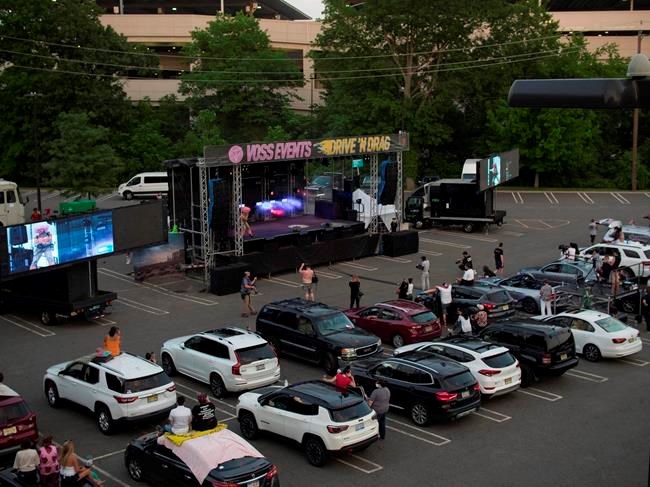NEW YORK — Angel Dougherty went to the mall last month — not to shop, but to watch a drive-in drag show in the parking lot.
“This year has been so anxiety filled and chaotic, I figured this experience would be something to lighten the mood,” says Dougherty, who paid to see the stars of TV's “RuPaul’s Drag Race” dance in front of hundreds of parked cars at a shopping
After being closed for months due to the coronavirus pandemic, malls are bringing all types of drive-in entertainment to their massive parking lots, hoping to lure people back to their properties.
A mall in upstate New York, for example, is hosting a drive-in wrestling match. Others around the country are bringing movies or magic shows that can be watched from a car.
It's a way to reintroduce people to the mall and eventually get them inside to shop, says retail consultant Kate Newlin. But that’s still a hard sell for anxious shoppers, especially with coronavirus cases spiking around the country.
“Nobody wants to go there,” Newlin says about malls. “Nobody wanted to go there before COVID.”
Malls have struggled to attract shoppers for years as more people shop online. But the pandemic has hit malls especially hard. Stores that they depend on, such as J.C. Penney, have filed for bankruptcy and are permanently closing several locations. Other mall tenants, such as the Gap, stopped paying rent while their stores were temporarily closed.
Retail consultant Jan Rogers Kniffen believes that up to half of the 1,000 malls in the U.S. will either close or be unrecognizable in the next two years. Before the pandemic, he expected only 300 to close over the next decade.
The drive-ins mean extra money for malls since production companies typically pay to rent a section of the parking lot. Details of the deals are kept private, but Newlin says renting out the parking lot won't make up for the loss of losing a major tenant like J.C. Penney.
Malls can benefit in other ways: Some deliver meals from the food court to the parking lot. Others encourage movie goers to park a couple of hours before showtime to pick up dinner inside.
Brandon Voss came up with the idea of a drive-in drag show at an Olive Garden, where his meal was brought to his parked car.
“If Olive Garden can do it, why can’t I?,” says Voss, whose company had to cancel this year's “RuPaul's Drag Race" tour, which would have been held at indoor venues around the world.
He found a willing partner in mall operator Westfield, which brought Drive N’ Drag to three of its malls, including ones in Seattle and Annapolis, Virginia.
Drive 'N Drag tickets start at $70 for two people and their car. About 300 to 400 vehicles can park at each show, a much smaller audience than Voss is used to.
“We usually play in arenas that Lady Gaga plays,” he says.
Westfield says it has been using its parking lots to draw crowds for years, with circuses, ice skating rinks and car shows. But it had to get more creative during the pandemic, hosting drive-thru high school graduations and other events where people can and socially distance in their car.
Kilburn Live, another production company, has turned five mall parking lots into drive-ins and is adding others. Cars are parked at least 8 feet way. Attendees can watch from the roof of their vehicle, outside of it or sit in an opened trunk of an SUV, as long as they stay in their designated spot.
“I’m glad they are bringing drive-ins back,” says Kimberly Shanks, a real estate agent in Lakewood, Colorado, who watched two movies from her SUV, parked near a Nordstrom at the Park Meadows mall in Lone Tree, Colorado.
Outside of malls, drive-in movie
Shanks, who watched “Detective Pikachu” and a “Harry Potter” movie with her son, felt it was a safer way to have a night out without being “too exposed to crowds.”
Much of what’s played in the drive-ins are older movies, such as “The Goonies” and “Ghostbusters,” since Hollywood has all but stopped releasing new films. But Kilburn has shown some new content, including concerts by country stars Garth Brooks and Blake Shelton, which were filmed just to be shown at drive-ins. And the company plans to keep things fresh by expanding into drive-in stand-up comedy and magic shows
What can be shown is also limited by the malls, which don't allow R-rated movies.
“We don’t want someone accidentally passing by to see something inappropriate,” says Michelle Snyder, chief marketing officer at Brookfield Properties, a mall operator that partnered with Kilburn.
Besides movies, Brookfield's malls have used their lots for drive-thru farmer's markets and drive-thru COVID-19 testing, a service many shopping
“We’re not closed to anything,” Snyder says.
Joseph Pisani, The Associated Press



